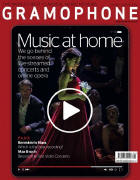Texte paru dans: / Appeared in:
|
|
|
Outil de traduction (Très approximatif) |
|
|
Reviewer:
David Vickers Before Bononcini joined Handel writing operas for London’s King’s Theatre during the 1720s, the highly esteemed Modenese composer, cellist and singer had successful stints in Bologna, Rome, Berlin and Vienna, where from 1698 to 1711 he was employed by emperors Leopold I and Joseph I. La conversione di Maddalena was first performed at the Hofburgkapelle during Lent 1701; its anonymous libretto presents the remorseful Mary Magdalene renouncing her lascivious past, with encouragement from her sister Martha, and contradictory advice offered by Divine Love and Profane Love. La Venexiana’s long-delayed return to the recording studio is under the direction of theorbist Gabriele Palomba; it is a nice touch that this is dedicated to Claudio Cavina, whose health problems led to his early retirement a few years ago. The solemnly twisting contrapuntal strings in the Sinfonia are played with both passion and refinement – characteristics that pervade much of this performance. Emanuela Galli’s quicksilver shaping of lines and articulate communication of Mary Magdalene’s journey from initial worldly sensuality to penitence are enthralling. A tempestuous vision of the abyss that awaits because of her promiscuity (‘Odi l’Etera’) leads cathartically into a weeping lament accompanied dolorously by reduced strings (‘In tepidi fiume di lagrime amare’); the character’s vacillations between listening to temptations and seeing the light are depicted in two arias requiring brilliant vocal agility in partnership with a pair of concertante violins (‘Cor imbelle’ and ‘Sì, sì risolvo’). Her eventual resolution to discard her jewels and shatter her mirror (‘Comincio a sospirar’) is sung with breathy remorse. Marta Fumagalli sings with firmly focused clarity in extrovert outbursts, such as Martha’s feisty prophecy that her sister risks the inextinguishable fires of hell if she continues to procrastinate repentance (‘Di lagrime, di gemiti’), but the alto also sings with simplicity and beauty in the compassionate warning ‘Quel volto, quel labro’ (in dialogue with gorgeous six-part concertino strings) and in praise of the sweet ecstasy that only sacred love brings (‘Tenerissimi sospiri’ – a musical counterpart of Bernini’s St Teresa). Matteo Bellotto’s Profane Love shows convivial bafflement at Magdalene’s newfound disdain for sinful pleasure, and his soft flattery that her beauty reflects the stars and that her blond locks are chains that captivate the soul and outshine the sun fit neatly with his philosophy that she can always repent much later on (a line delivered with a subterranean low note that ought to give her a clue about where his charm offensive will lead her). Francesca Lombardi Mazzulli’s vivid shading and extrovert imploring guarantee that Divine Love is no shrinking violet – ‘Fugge il tempo, e seco a volo’ and ‘Oh d’un’alma che non ha fede’ typify the soprano’s highly decorous embellishments, fondness for broad dynamic range and exaggerated contrasts within phrases; albeit gripping, perhaps less could have been more. Nevertheless, convincing recordings of complete large works by Bononcini are as rare as hen’s teeth, which makes La Venexiana’s masterful advocacy particularly welcome. |
|




